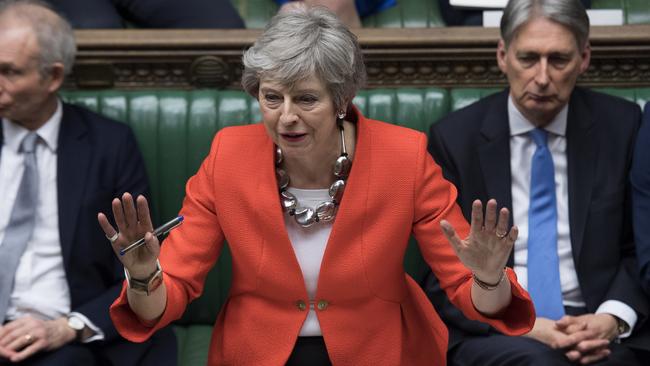Brexit: Australian exports face UK tariff hit
Australia’s hopes of an enhanced agricultural trade with Britain have been tempered by surprise tariffs on agricultural goods.

Australia’s hopes of a greatly enhanced agricultural trade with Britain in a no-deal Brexit world have been tempered by imposition of surprise tariffs on agricultural goods such as beef, pork and lamb.
Just hours after British Prime Minister Theresa May suffered a second humiliating loss of her Brexit withdrawal bill, the government released information about how trade would work if Britain were to leave the EU without any deal on March 29.
While 87 per cent of imports into Britain will face no tariffs, the government said it was important to protect the car and agricultural industries from cheap imports affecting jobs.
However, the proposed tariffs for the agricultural industry will be lower than rates currently imposed by the EU. Beef will be taxed at 53 per cent of the current EU rate, while poultry will be at 60 per cent. Milled and semi-milled products will be taxed at 83 per cent of the EU rate.
In the past decade, about 2 per cent of Britain’s beef has come from Australia, yet before the UK joined the European Common Market, up to 80 per cent of Australian beef and wool exports went to Britain.
Australian sheep farmers will be particularly disheartened to find that tariffs on sheep meat will remain the same as those imposed by the EU.
The rates will apply only if Britain leaves the EU without a deal. If a deal is struck, Britain may be compelled to adopt EU tariffs as standard.
Australia and the UK have agreed to begin free-trade talks as soon as possible after Brexit where many of the new tariffs, said to be temporary until Britain has settled into Brexit, will be negotiated.
Downing Street said last night that in special arrangements for Northern Ireland, the temporary import tariffs will not apply to EU goods crossing the border from the republic, which has attracted concern that Northern Ireland will become a smugglers’ paradise.
Amid all the uncertainty, one almost unthinkable option has emerged to help Britain out of the chaos: to revoke article 50.
Britain has the ability to unilaterally decide not to leave the EU, a decision that may be politically disastrous but technically astute.
In this scenario, Britain wouldn’t have to pay any EU financial penalties for extending article 50 and could then enact the two-year period to leave the EU on its own timetable and restart the negotiating period with the EU when it was more prepared.
Mrs May even spoke of it when she responded to the defeat of the Withdrawal Bill by a margin of 149 votes, despite her last-gasp flight to Strasbourg to shore up legal commitments around the Irish border backstop issue.
She said the House of Commons now had unenviable choices: “Does it wish to revoke article 50? Does it want to hold a second referendum? Or does it want to leave with a deal but not this deal?
“These are unenviable choices but thanks to the decision the house has made, they are choices that must now be faced.’’
Mrs May’s motion tacked her twice-defeated Brexit bill on to the end of it, effectively trying to re-introduce the failed Withdrawal Bill a third time as the only effective Brexit deal on the table.
She allowed a free vote on the no-deal Brexit motion, which averted a Tory crisis as many in her cabinet had threatened to resign, but also exposed her ever-weakened hold on the party.
MPs spoke freely of Mrs May’s lame-duck leadership. “She looked broken,’’ said Mike Gapes, a former Labour stalwart who defected to the Independent Group.
If, as expected, parliament votes to reject a no-deal Brexit, it will have to vote again tomorrow on requesting an extension to article 50 from the EU.
European Council president Donald Tusk said there must be a reasoned request and a credible justification to extend article 50 and the EU member states would consider it and decide by unanimity. He also believed that the chances of a no-deal Brexit had “significantly increased’’.
Carolyn Fairbairn, the director-general of CBI, the peak business group in London, said: “Enough is enough.
“This must be the last day of failed politics.
“A new approach is needed by all parties. Jobs and livelihoods depend on it … it’s time for parliament to stop this circus.”
Australia Trade Minister Simon Birmingham said his government had prepared for any possible scenario to ensure seamless trade between Australia, Britain and the EU.
“We have done everything we can as the government to prepare for any possible scenario; we’ve applied new laws and written new agreements with the UK to make sure that so far as we can, trade will continue to flow seamlessly to the UK and the EU,’’ Senator Birmingham said.
“There are a range of considerations for Australian businesses who trade with the UK or the EU.
“We have advice available on both the Austrade and the Department of Foreign Affairs and Trade websites and I would encourage businesses to look at that advice to seek their own commercial information.”



